De'Longhi La Specialista Arte Evo review: the bean-to-cup coffee machine that'll have you bossing the barista basics in no time
De'Longhi La Specialista Arte Evo: two-minute review
The De'Longhi La Specialista Arte Evo Espresso Machine with Cold Brew is available to buy in the US, UK, and Australia. They have slightly different product names in each territory: in the US, the model code is EC9255M, and it’s called La Specialista Arte Evo Espresso Machine with Cold Brew. In the UK and Australia, the model code is EC9255.M, and the full product name is La Specialista Arte Evo Compact Manual Bean to Cup coffee machine with Cold Brew in the UK, and La Specialista Arte Evo Cold Brew in Australia.
Specialista Arte Evo is listed at $699.95 / £549.99 / AU$699 on the official De'Longhi website. You can also purchase it from third-party retailers, including Amazon in the US and the UK, which offer discounts on occasion.
For a quality manual bean-to-cup coffee machine with cold brew capabilities, this is pretty good value, and the De'Longhi La Specialista Arte Evo should be considered alongside one of the best espresso machines.
A compact example of a manual bean-to-cup espresso machine, the Arte Evo has dimensions of 11.2 x 14.4 x 15.9 inches / 285 x 365 x 400mm, and is a pretty weighty 21.5 lbs / 9.3 kg. I did feel that it had the potential to move around despite this, so I always tended to have a steadying hand on the machine whenever I pushed the portafilter and tamper guide in to receive the ground coffee.
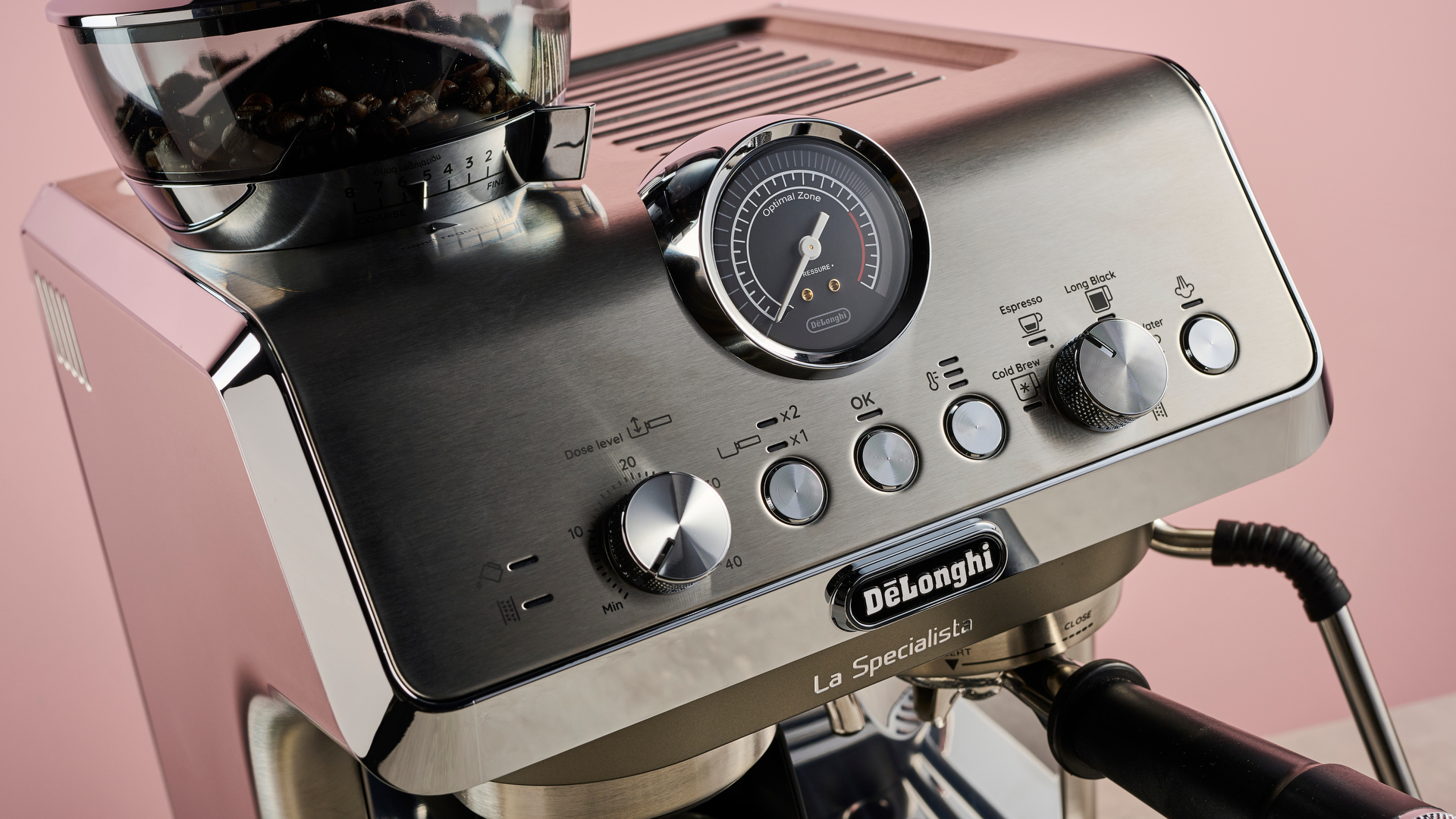
There is a helpful small storage compartment in the top of the machine, to the right of the hopper. The My Latte Art steam arm sits on the right of the coffee-making area and can be rotated out, so I could easily get the included metal milk jug under. Located on the back of the machine, the generous 56 fl oz / 1.7L water tank was easy to remove and replace.
One thing I missed with the Arte Evo, is that it doesn’t have changeable hoppers, so it can prove tricky if you like to switch between caffeinated and decaffeinated coffee. I can’t really complain about this considering the price though, as it’s mainly the more premium coffee machines that have this ability.
There are three temperature settings to choose from on this manual espresso machine, so it can be adjusted to suit whichever beverage is being made, and eight different bean-grinding settings to achieve the right intensity, and I found this useful for perfecting different coffee options.
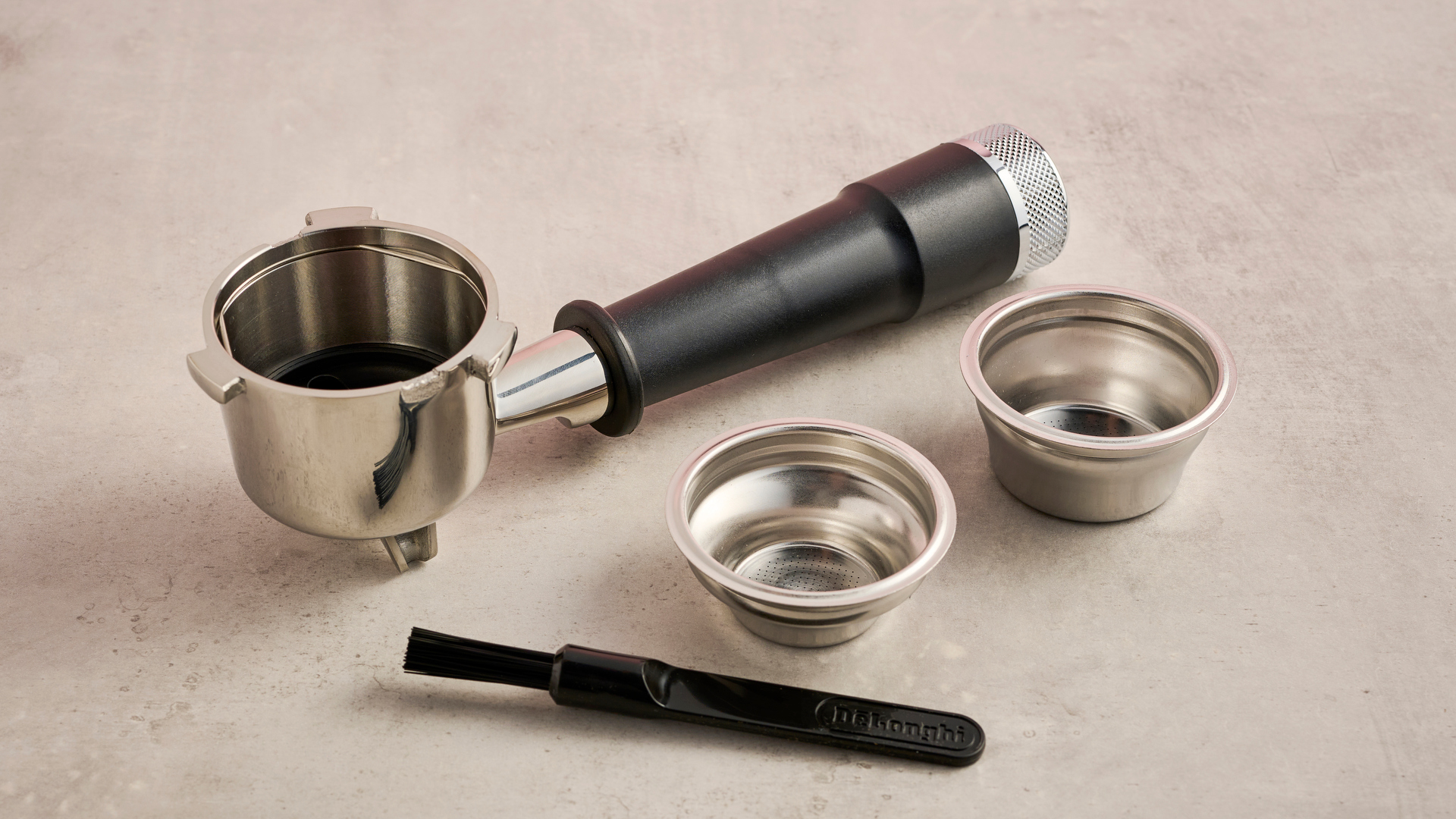
The Arte Evo comes with two single-walled coffee filters in a single and double dose. The filters were unusually difficult to get out of the portafilter once pushed in. I had to use a taper-ended butter knife to remove the filter each time, so this isn’t the end of the world, but care will need to be taken when attempting to remove them.
The De'Longhi La Specialista Arte Evo was delightfully straightforward to use. The setup process was quick and simple, and thanks to the helpful tips in the quick guide it was easy to determine the perfect grind coarseness, dosage, and techniques to create tasty cups of coffee.
I’m a huge fan of this coffee machine, and I’d recommend it as the best in this price bracket, but if you think you might want some different features or you prefer a different aesthetic, you could always take a look at our selection of the best bean-to-cup coffee machines to see if anything catches your eye.
De'Longhi La Specialista Arte Evo review: price and availability
- List price: $699 / £549 / AU$699
- Available in the US, UK, and Australia
The list price for the Specialista Arte Evo is $699.95 / £549.99 / AU$699 on the official De'Longhi website. It’s available from other third-party retailers too, including Amazon in the US and the UK, where the price is occasionally discounted.
This is pretty good value for a quality manual bean-to-cup coffee machine with cold brew capabilities, and while it may not have as many grind settings or auto-tamping as the reigning champion of our selection of the best bean-to-cup coffee machines, the Sage Barista Express Impress, this compact De'Longhi espresso machine offers cold brew and is a whole lot cheaper.
- Value score: 5/5
De'Longhi La Specialista Arte Evo review: specs
De'Longhi La Specialista Arte Evo review: design and features
- Quick and easy setup
- Dishwasher safe accessories
- Smaller-than-average footprint for manual bean-to-cup machines
The De'Longhi La Specialista Arte Evo is fairly compact as far as manual bean-to-cup espresso makers go, with dimensions of 11.2 x 14.4 x 15.9 inches / 285 x 365 x 400mm. It’s understandably a bit weighty at 21.5 lbs / 9.3 kg, but this is fine as it’s a product that’s not intended to be moved around. One thing I will say, though, is that it didn’t feel quite heavy enough for me to push the portafilter and tamper guide in to receive the ground coffee without a hand on the machine to hold it in place.
One small niggle is that there isn’t the option to have changeable hoppers, which can prove to be a pain if you’ve left the beans in for too long, or if you like to switch between caffeinated and decaffeinated coffee, for example. It’s only really more premium coffee machines that offer this, so I can’t complain much considering the price of the Arte Evo. If you only use the amount of beans needed to avoid leaving them sitting for too long, or only use one kind of bean, you shouldn’t have any problems.
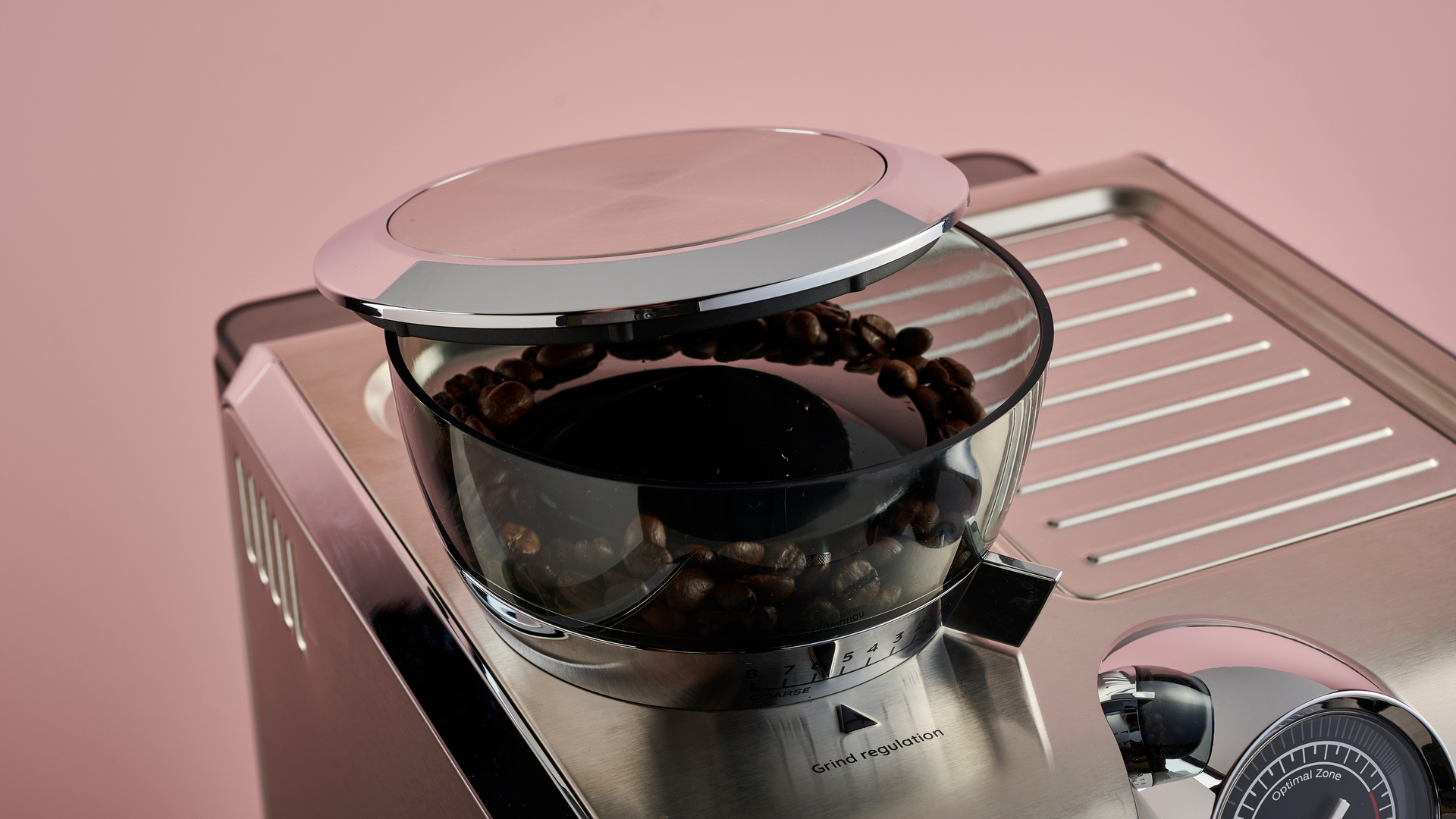
To the right of the hopper, there is a small storage compartment that could fit the filter baskets and small cleaning utensils. At first, I believed that the UK model didn’t come with a tamping mat, as it is not obviously listed on the De'Longhi UK website, but it turned out to be hidden underneath the base fitment in the accessories box. I found it really helpful when tamping my coffee, with a circular indentation for the tamper to sit in, and a shaped area for the portafilter. This also fit the tamper slot after it was removed before attaching the portafilter to the machine, so it was easy to keep things neat and tidy through each stage.
The Arte Evo also comes with a small cup support, to give those mini espresso glasses a little boost. The removable water tank is easy to remove and replace. It has a 56 fl oz / 1.7 capacity, which is plenty for a few cups of java, while also remaining light enough to be maneuvered easily.
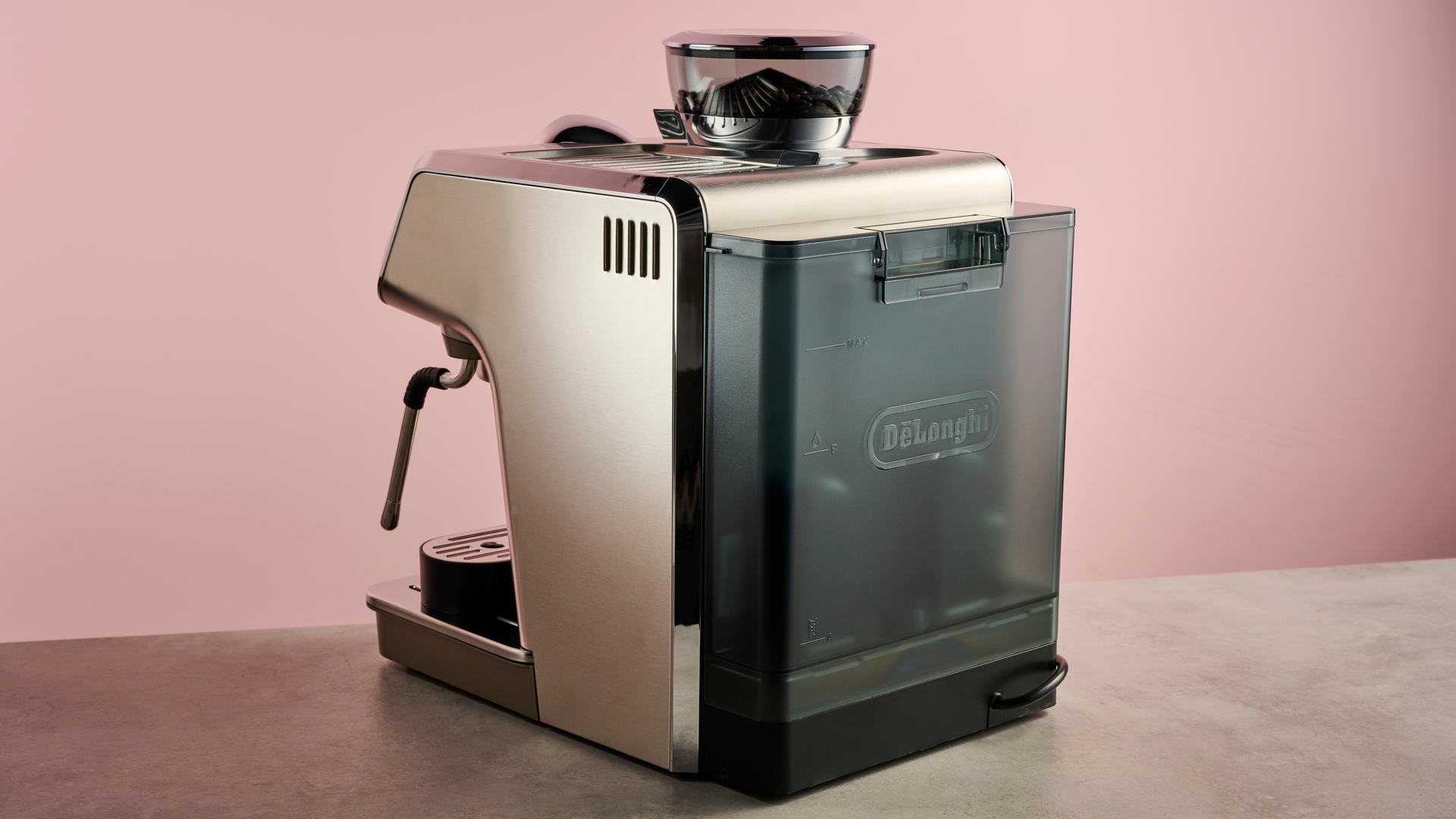
The layout of the grinder, extractor, and My Latte Art steam arm is fairly standard, but the steam arm is in close proximity to where the extraction area and small cup support sit in a bid to save some space. The steam arm rotates outwards, so I could easily get the included metal milk jug under.
Inside the removable drip tray sits a red plastic water level indicator that rises through the cup grille as the tray fills up so it can be emptied before it gets too full. Speaking of the drip tray, it’s really easy to remove for emptying and cleaning. It breaks down into three parts: the cup grille, the cup grille support, and the drip tray itself.
There are three drink presets to choose from, Espresso, Americano (Long Black in the UK and Australia), and Cold Brew. The My Latte Art steam arm was easy to maneuver and I was able to use it to create smooth microfoam, as well as using it to heat and add body to the milk when mocha and cappuccino making.
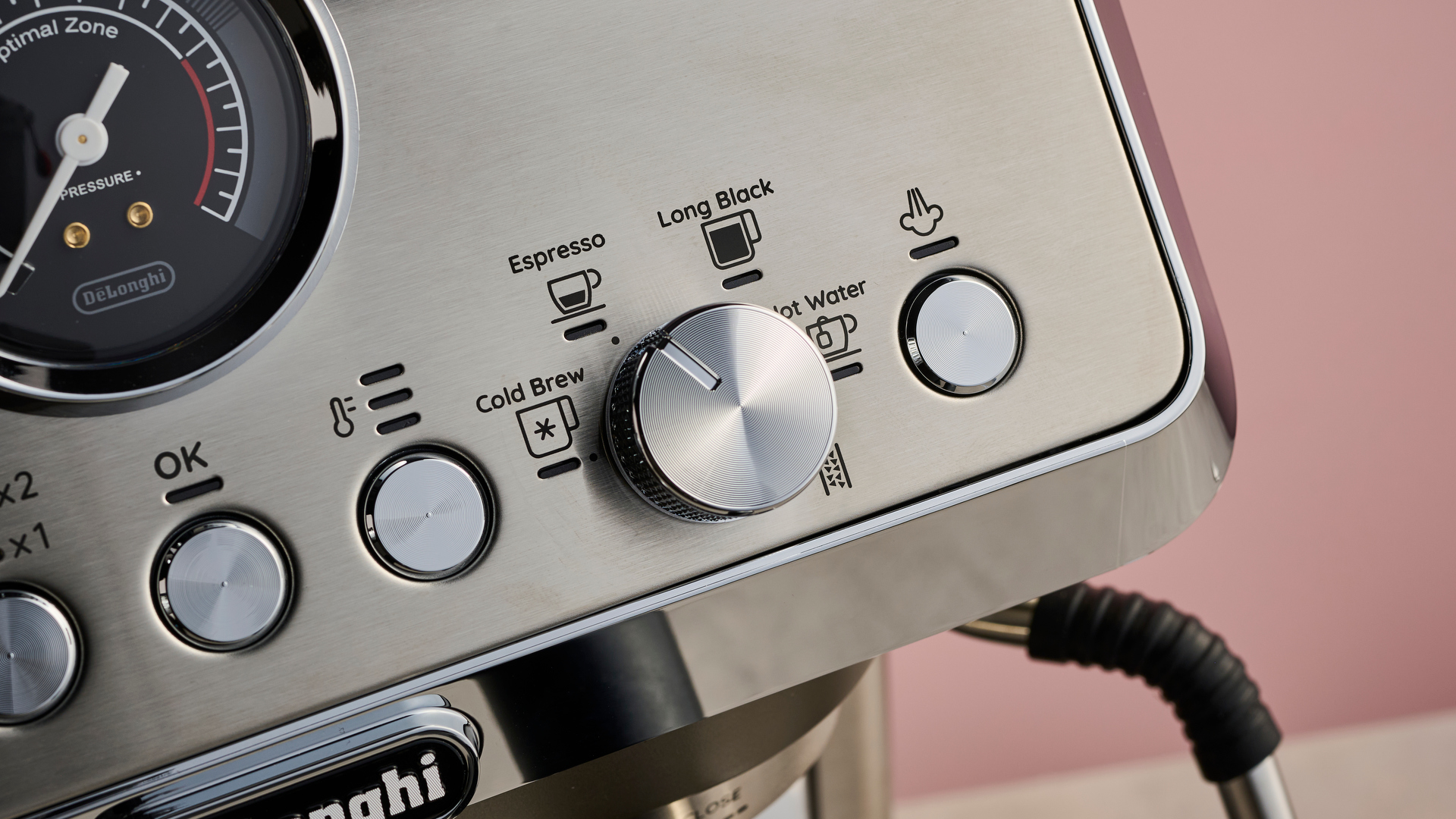
The Arte Evo has three temperature settings to choose from, so it can be adjusted to deliver the best results for whatever you’re making. It also has eight different bean-grinding settings to achieve the ideal intensity. I mostly used level five for americanos and espresso shots (which I of course used to make my beloved mochas), but I found that level six worked best for cold brews.
The My Latte Art steam arm was easy to maneuver, and thanks to the tips in the quick guide I easily created a smooth microfoam. I also used the steam arm to heat and add body to the milk for mocha making, which I did a lot of in my time with it, as it quickly became my favorite way to make coffee each day.
- Design score: 4.5/5
De'Longhi La Specialista Arte Evo review: performance
- Simple to use
- Hassle-free
- Great results
Straight out of the box, the setup and coffee-making process was straightforward. The De'Longhi Quick Guide manual was easy to follow and made setting up this espresso machine a breeze. Plus, for those who are new to a manual bean-to-cup coffee machine, or you’re a visual learner, De'Longhi also has a useful how-to YouTube channel where you can see videos of their coffee machine setup processes.
After washing and drying the accessories and water tank, I put the drip tray back in place and filled the water tank before rinsing the included SoftBalls sachet under running water and dropping it into the tank. Each SoftBalls sachet lasts for three months and is designed to prevent limescale formation without affecting the quality of the coffee. After plugging the machine in and turning it on, I placed a glass bowl under the water spout before pressing okay to initiate a short rinse cycle. I then popped a filter basket into the portafilter before locking it into place, then hit okay again so that it rinsed through.
Some things to note here are that it’s tricky to get the filter baskets out of the portafilter: I had to use a taper-ended butter knife to prise them out, and in addition, it took a fair bit of elbow grease to get the portafilter to lock into place. Perhaps those stronger than me won’t have as much of an issue, but I found myself having to put my other hand on the machine to brace myself when inserting or removing the portafilter. The final part to be flushed through was the steam arm, which was just a case of placing it into the bowl and pushing the steam button on the machine.
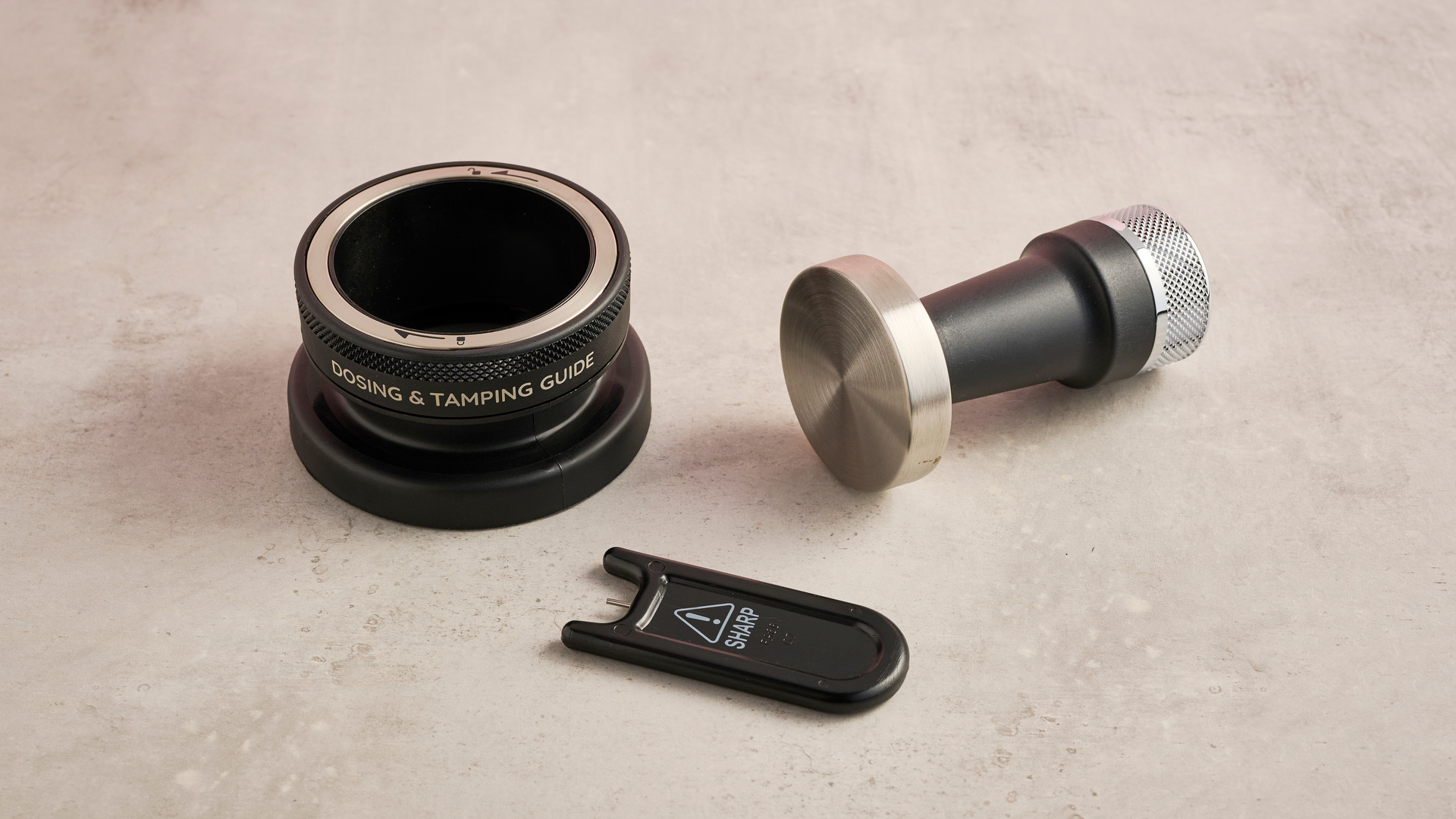
Once the machine was all set, I experimented with the grind and dose levels until I was happy with the result. This De'Longhi machine comes with a really helpful dosing and tamping guide that simply screws onto the top of the portafilter, so it’s easy to give it a few taps to help the coffee grounds settle before pushing them down with the satisfyingly weighted tamper.
The quick start guide had a helpful little Infusion Temperature Profiles box out, explaining that different beans and roasting colors require specific temperatures, informing me that Robusta coffee beans prefer a lower temperature, and Arabica beans like a higher temperature. As I was using Arabica beans, I used the maximum temperature option (level three) and selected my drink using the right-hand dial, which for my first attempt was an espresso.
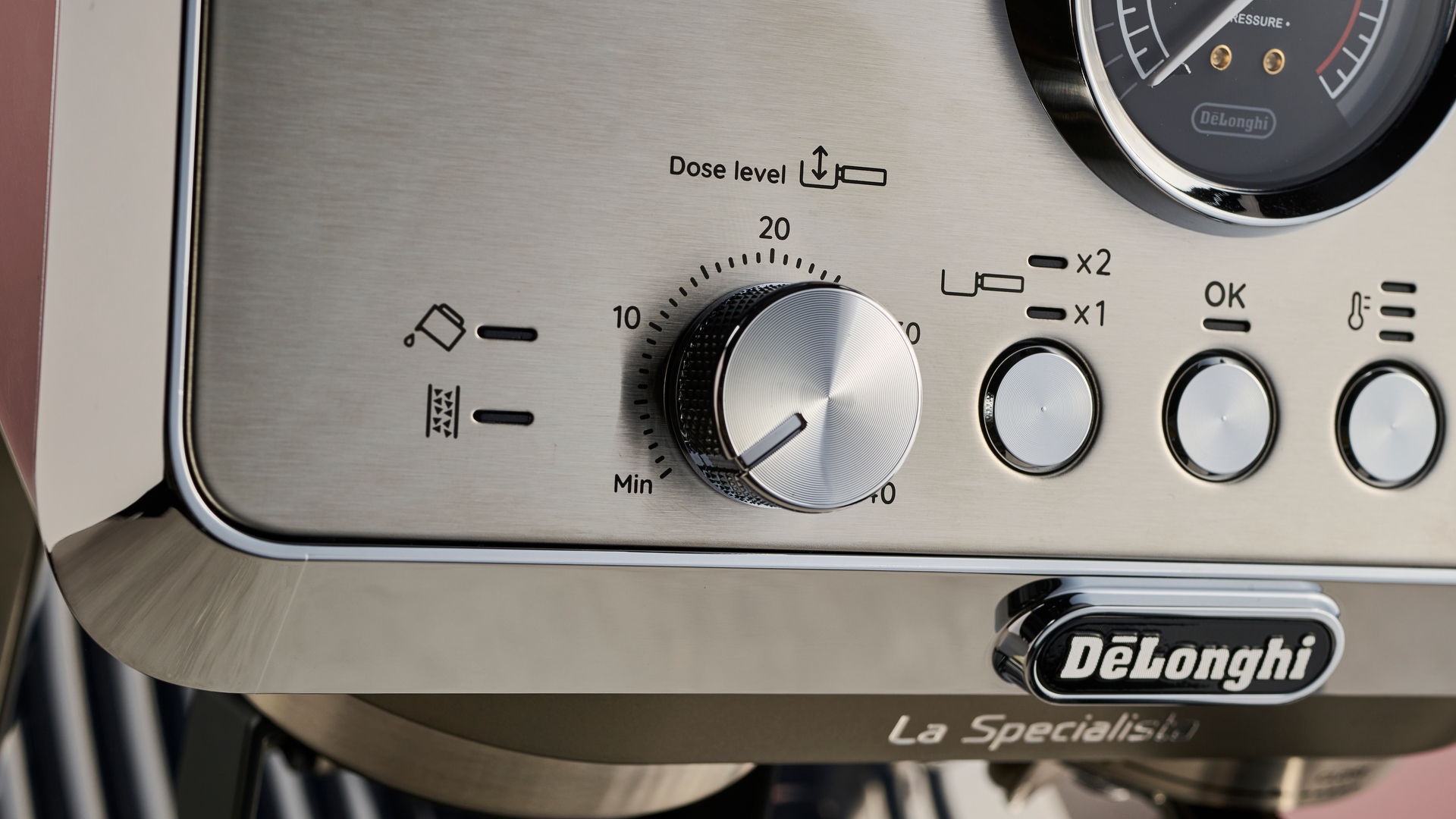
Following the instructions and tips helped me to make a pretty perfect espresso shot in a few minutes. There wasn’t quite as much crema as I’d anticipated, but other than that it was great. When trying out the steam wand on some semi-skimmed milk, I once again found the quick start guide super helpful with its additional barista tips, recommending that fresh cold milk is used and that the metal milk jug is cold. The visuals provided a little guidance, explaining where the nozzle should be placed to get the milk to froth, and these pointers helped me make some lovely foam for a cappuccino on my first attempt.
The Thermoblock heating system and active temperature control feature seemingly worked well during the brewing process, as the extracted coffee tasted spot-on every time. All three presets delivered satisfying and great-tasting results. I used the Espresso preset most frequently, combining it with steamed milk and hot chocolate powder, as I am quite partial to a mocha.
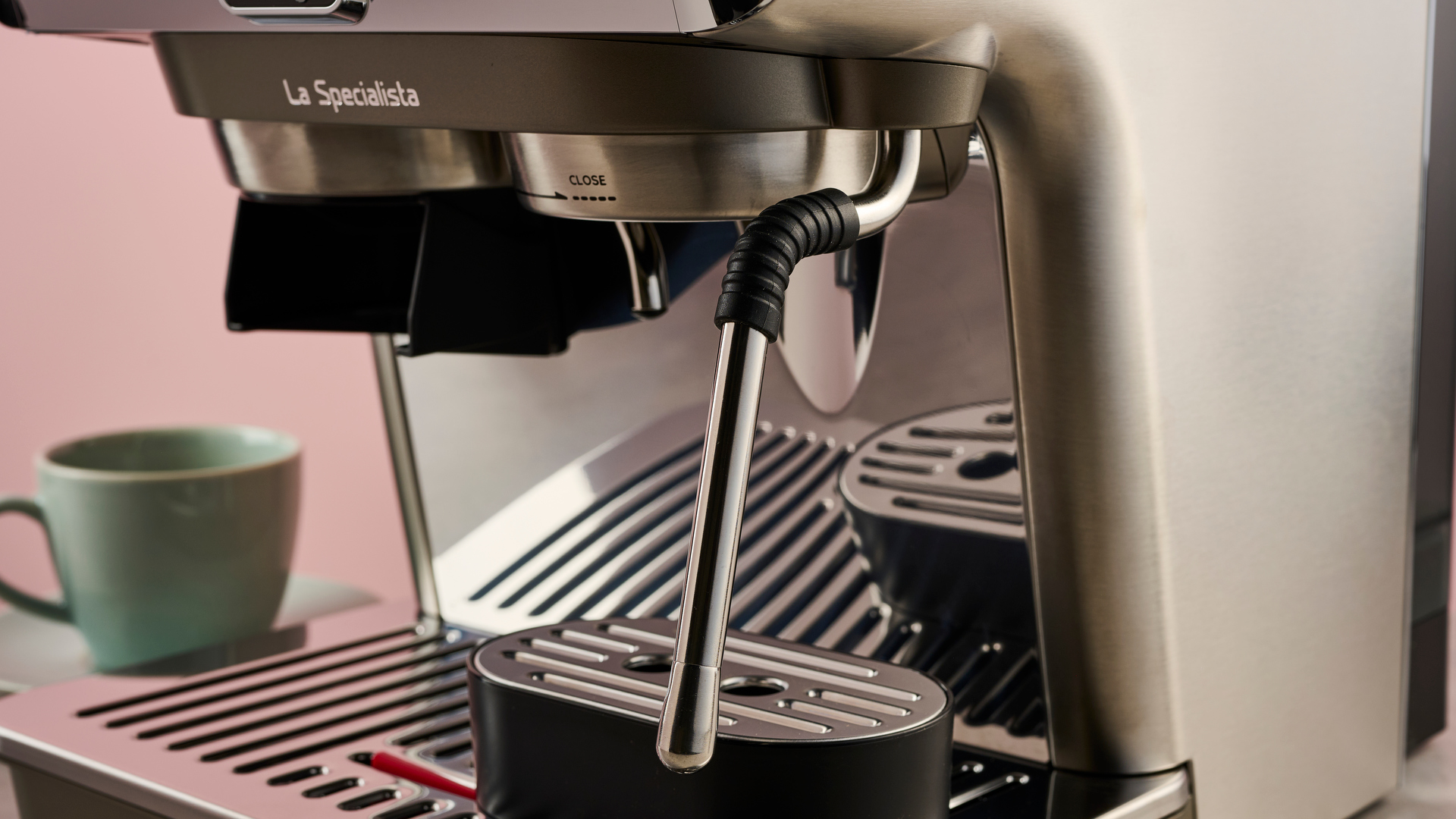
I’ll admit that cold brew coffee isn’t really my thing, so I roped in my very helpful editor to do a taste test for me. I ground a single dose of espresso, which the Arte Evo mixes with 3.7 fl oz /110ml of water; alternatively, I could have ground a double dose, which would then have been used to create a 6 fl oz / 180ml sized drink. In his opinion, the coffee tasted nice, wasn't overly bitter as you'd expect from a cold brew, but it was a little too diluted for his taste.
De'Longhi recommends a grind coarseness of between four and six for cold brew. Originally I aimed for the middle with level five, so I increased the coarseness to level six following the feedback from our team's resident cold brew fanatic. He confirmed that this tweak to the settings did indeed make it stronger and, although not perfect, it was more to his tastes.
Cleaning the machine was fairly straightforward. The drip tray and grill can be removed easily and are dishwasher safe. For thorough cleaning, it’s recommended to run a mixture of white vinegar and water through the water spout, portafilter, and steam arm.
- Performance score: 5/5
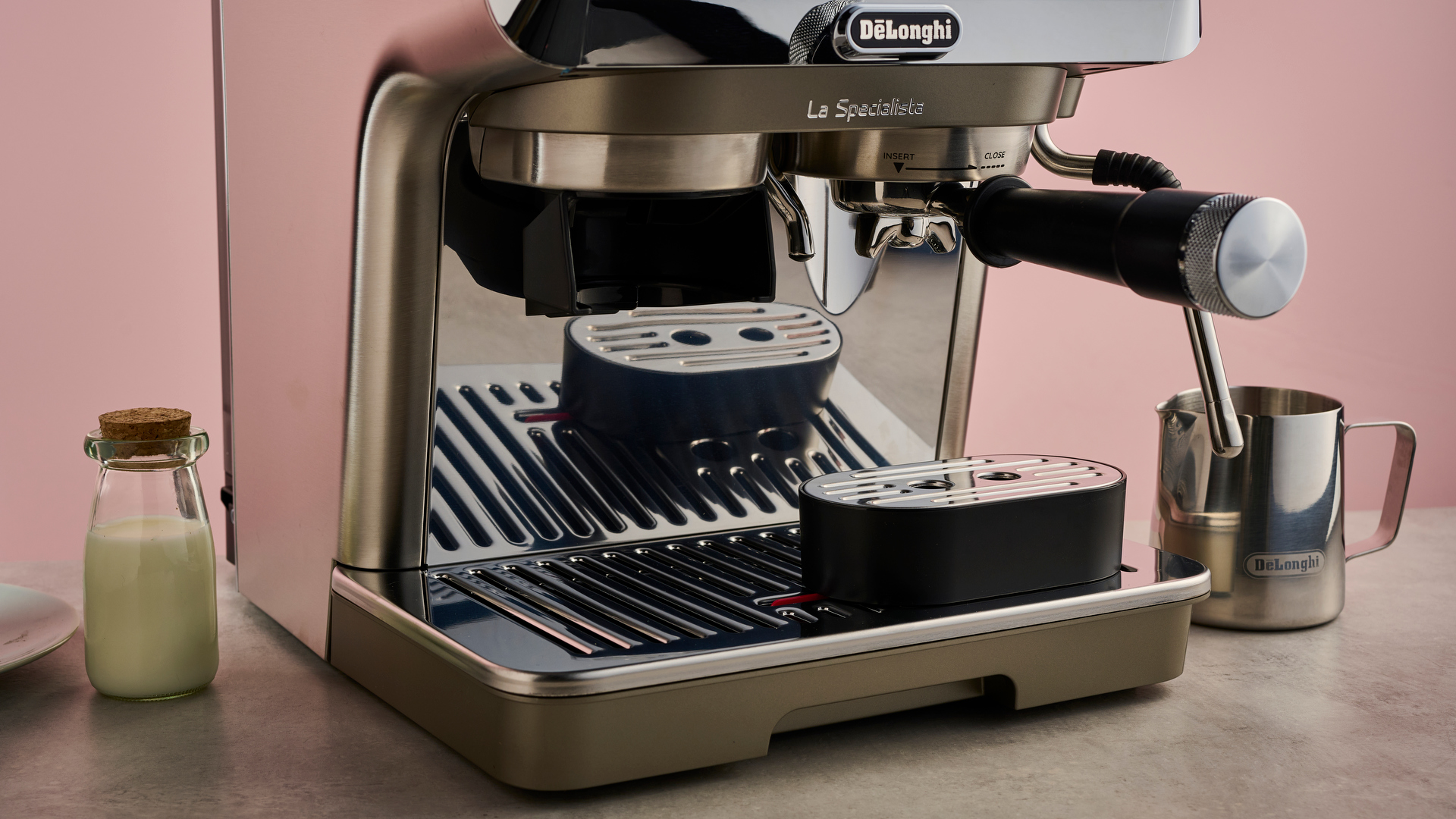
Should I buy the De'Longhi La Specialista Arte Evo?
Buy it if
You want to be your own barista
As the Specialista Arte Evo is easy to operate, and the quick start manual offers so many helpful tips, you’ll be brewing up all kinds of beverages for your family and friends in no time.
You don’t want to dedicate too much space
No manual bean-to-cup machine can be truly compact due to the nature of the espresso-making process. But De'Longhi has been mindful of how valuable countertop space is in our kitchens, which is reflected in the smaller-than-average footprint of this machine.
You want fancy coffee at home
With the La Specialista Arte Evo Espresso Machine, you’ll have the freedom to make your own espresso, cappuccinos, lattes, mochas, cold brews, and more, right from the comfort of your own kitchen.
Don't buy it if
You don’t want to have to clean up after every cup
Whether you have your coffee black or white, there’s extra maintenance to consider when it comes to a manual bean-to-cup machine. The extracted ground coffee will need to be knocked out of the filter and rinsed, and any milk will need to be wiped off the steam arm straight away to stop it from solidifying (which it likes to do very quickly).
You want your coffee quick
The process of making a coffee with the Arte Evo isn’t particularly long when compared to similar machines, but compared to a standard instant coffee, it naturally takes longer due to the extra steps involved. It’s certainly worth the effort, though!
You don’t want to get into tweaking settings
Due to the different settings available, including dose adjustment, grinding levels, and water temperature, it may take time to perfect the settings to get the right brew for you.View Deal
De'Longhi La Specialista Arte Evo review: also consider
Ninja Luxe Café
For those who want to take some of the guesswork out of their budding barista journey, the Ninja Luxe Café is a great beginner machine thanks to its grind coarseness guidance, weight-based dosage system, and automatic milk frother. It also has a slightly larger water tank, a removable hopper, and a digital display. Our reviewer was mightily impressed when they tested it out, awarding it four and a half stars. Check out the full review of the Ninja Luxe Café for further details.
De'Longhi Dinamica Plus
Undoubtedly more expensive, but the perfect alternative if you don’t want to take a hands-on approach to coffee making. It’s packed full of features, including a removable ergonomic thermal milk carafe that can be kept in the fridge to keep the milk fresh and cold. Interestingly, this machine is compatible with the De'Longhi link app, allowing you to perform some of its functions remotely. This too was awarded four and a half stars, with little in the way of negatives. Read the full De'Longhi Dinamica Plus review here.
How I tested the De'Longhi La Specialista Arte Evo
- I tested the De'Longhi La Specialista Arte Evo over a few weeks
- I repeatedly made espresso and frothed milk four days a week
- I tested its variety of settings and features
I used the De'Longhi La Specialista Arte Evo Espresso Machine roughly three times a day, four days a week for several weeks, for the most part making mochas, cappuccinos, lattes, long blacks, and the odd cup of tea.
I evaluated how easy it was to put together, and how easy the setup process was. I made use of all of the features, paying close attention to the process, testing how easy the machine was to use, and the quality of the drinks produced. I tested all of the different coffee types available, and used all of the included accessories to see how they performed.
Finally, I investigated how easy it was to remove the washable parts of the machine and see how easy they were to clean.
Read more about how we test.
First reviewed August 2024
0 comments:
Post a Comment